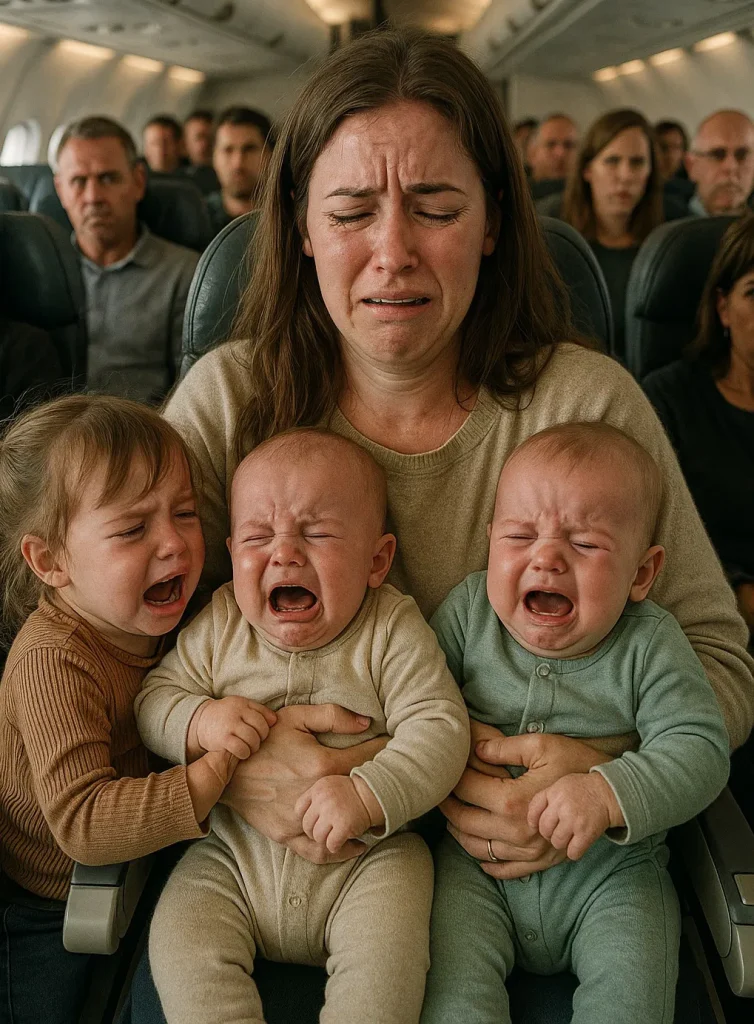
The first time I traveled alone with all three of my babies, I thought I was ready.
Diaper bags packed, bottles pre-filled, toys neatly arranged in the carry-on, and snacks stashed for any emergency.
I told myself I could handle it—after all, I was their mother. If anyone could do it, it was me.
But nothing prepared me for what unfolded at 30,000 feet.
My husband and I boarded the plane together with our three little ones—Emma, two years old, and the twins, Noah and Grace, just six months.
From the very beginning, it felt overwhelming: Emma wriggling in her seat, the twins fussing, their cries filling the tight cabin space.
Then, minutes after takeoff, my husband leaned in and whispered, “I’m going to switch seats with someone to take a little break.”
Before I could protest, he was already moving down the aisle to an empty row several seats away, leaving me stunned and alone.
Surrounded by my three small children, the heavy weight of responsibility pressed down on me.
I tried to stay calm, bouncing Noah on my knee and cradling Grace against my chest, while Emma tugged at my sleeve, demanding attention.
Then, as if on cue, all three burst into loud, piercing cries at once, a cacophony that shook the entire plane.
Heads turned, frowns appeared, and sighs filled the air—no words, but a clear weight of judgment bearing down from every direction.
My arms trembled as I struggled to hold two babies at once, fumbling with a bottle while Emma pulled desperately at me.
My heart raced, my cheeks flushed, and the more I tried to soothe them, the louder the crying became.
For a moment, I wished I could disappear into the seat cushion, escape the stares and whispers surrounding me.
Then something entirely unexpected happened—the cockpit door opened.
Out stepped the pilot, tall and calm in his uniform, and instantly the cabin quieted at his presence.
He walked steadily toward me, stopped beside my seat, and in a gentle voice asked, “Ma’am, may I help you?”
I froze, hardly believing my ears. “You… want to help?” I whispered.
He smiled warmly, without a hint of judgment, and said softly, “If you’ll let me.”
Without hesitation, he carefully lifted Noah into his arms, rocking him with practiced ease and steady hands.
Within minutes, Noah’s cries softened to hiccups, then quieted as he drank peacefully from the bottle.
Grace relaxed against me, Emma watched wide-eyed, and gradually, the chaos faded like a passing storm.
The tension in the cabin eased, and a few passengers even smiled quietly as they observed the scene.
For the next fifteen minutes, the pilot stayed by my side, holding Noah, steadying bottles, and sharing stories about his own grown children.
His words—recollections of sleepless nights and endless crying—felt like comfort for my frazzled nerves.
Finally, when all three babies were calm, he returned Noah to my arms and said warmly, “You’re stronger than you realize.”
When we landed, a woman touched my shoulder and whispered, “That was one of the kindest things I’ve ever seen. Don’t forget—you’re doing an amazing job.”
I nearly cried again, overwhelmed with gratitude. Later, near the gate, I thanked the pilot once more.
He simply smiled modestly and said, “It wasn’t heroic. It was just the right thing to do.”
At 30,000 feet, abandoned by the one person I expected to lean on, a stranger’s kindness lifted me from despair.
His small act reminded me that compassion still lives—often when and where we least expect it.
As I left the airport carrying my babies, I carried with me something else—the unforgettable memory of a pilot who chose kindness over judgment.